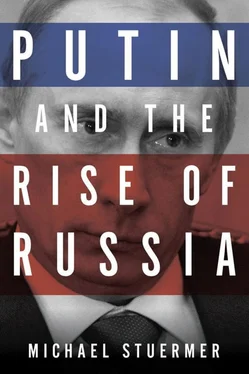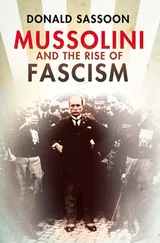In the long run, Russia’s national interest will force Russia to mend fences with the Europeans and with the new administration in Washington. Climate change, terrorism, Islamic jihad, cyber space, drugs, organized crime – all of the above force Russia into concerted action with the Atlantic nations, and vice versa. A long-term sustainable relationship, however, rests on the assumption that Europeans and Americans slow down the race to the Kremlin in order to obtain special favours. Most importantly, the self-fulfilling prophecy of mutual enmity has got to stop. It is too perilous to be pursued, and it can end in tears.
Dmitri Medvedev in all of this is not only an heir to Putin and to Russia’s troubled past. He wants to go down in history as a great reformer. On 14 February, at Krasnoyarsk en route to the presidential elections, he began his address by quoting Catherine the Great: ‘Liberty is the soul of everything, without it everything is dead. I want everybody to bow under the law but not as a slave.’ Medvedev is the man to pronounce that freedom is better than slavery, that democracy is a productive force, that modern societies need to combine freedom and the rule of law and, finally and foremost, that the fundamental interests of Russia and the West are mutually compatible and, in fact, mostly complementary. The rest is, from time to time, a little intelligent conflict management.
War brings things to light that otherwise remain obscure. The five-day war in the southern foothills of the Caucasus is no exception. Russia has drawn a red line to be respected not only by a small neighbour, but also by the Europeans and by the imperial power from beyond the sea. Russia plays according to age-old rules. What is at stake is not so much the affiliation of the little border districts long controversial between Georgia and Russia. The paramount objective is to keep NATO and the US at a distance. You must protect your periphery and, if possible, position your soldiers on both sides of the fence; and expect compensation (in the Caucasus, for example) when you have lost something elsewhere (in the Balkans, for example). Politics is seen as a zero-sum game, and is not for the faint-hearted. Sending in the military is the continuation of political intercourse by other means. Before the West gets red under the collar, it would be wise to reconsider the path to South Ossetia.
Russian assertiveness in the ‘Near Abroad’ is a prelude, and more, no doubt, is to come. After the Georgian leadership got out of control and sent in the tanks, the West was not going to allow itself to be dragged into a real war, nor will Russia take more than a calculable risk. In between, however, there are at least a handful of frozen conflicts in Russia and around Russia, most notably the Crimean Peninsula – now part of Ukraine – that can be unfrozen at any time. Much as the Jugo-succession is still sending tremors across the Eurasian continent, the Soviet succession has not yet found a trust-inspiring form. Legality and legitimacy are at odds in many places. But from now on Russia will insist on a decisive say over the Soviet succession, well beyond today’s Russian borders. This implies conflict and crisis and, possibly, even military confrontation. Russia under Putin has put the West on notice.
The August 2008 crisis casts a long shadow. But it is not too early to pose the question as to who are the winners and who are the losers. On the losing side the Georgian president figures prominently. He failed to settle the problem of those breakaway territories of Abchasia and South Ossetia that Georgia had inherited from the Soviet Union. He has also compromised, probably for a long time to come, the chances of Georgia becoming an associate member of the two foremost Western clubs, EU and NATO. If the US, seconded by the Eastern Europeans, presses for membership, Washington risks a severe crisis within the Atlantic Alliance, with Germany and France unwilling to alienate Russia and compromise their energy supply as well as their promising trading position.
On the losing side too, while the US elections were on, is Barack Obama. The dynamics of the election campaign have changed in favour of the Republican frontrunner John McCain who, when it comes to Russia, has firmly established himself as a hardliner.
The European Union is also among the losers. Once again, the Kremlin has pursued a traditional divide-and-rule strategy. In strategic crisis management, Europe is essentially unable to translate economic clout into political negotiating power. It was a favourable coincidence that when the crisis broke French President Nicolas Sarkozy held the rotating presidency of the European Council, bringing to the table the combined might of France and the EU. But by and large the EU has not had much of an impact. The EU’s ‘Nabucco’ project through Georgia, the southern alternative to Gazprom’s virtual pipeline monopoly for natural gas flowing in the direction of European consumers which bypasses Russia, has declined in credibility. Its very feasibility, now that the physical risks have becom apparent, is now in jeopardy.
Nor can the US be counted among the winners. Not only was the State Department – according to Secretary of State Condoleezza Rice – unable to restrain the Georgian leaders in the run up to the ill-chosen military intervention; the Russians also demonstrated to the US the limits of their control over faraway places. If in the future the US carries on regardless and pursues NATO membership for Georgia and Ukraine, it risks rendering the Atlantic Alliance hollow and overstretched, or entering into a serious and fundamental conflict with a resurgent and assertive Russia – or both. If the US pushes for a Membership Action Plan for either Georgia or Ukraine – or both – they are upping the ante. In that case Ukraine, an unstable political proposition by any standard, will be under severe strain and could break apart, with uncontrollable repercussions throughout Europe and beyond.
Moreover, all of the important issues pending with Russia, from containment of Iran to control of the drugs-and-weapons bazaar, from climate change to mass migrations, will be much more difficult to negotiate, let alone bring to a satisfactory conclusion. In the wider geopolitical context, Russia’s Chinese and even Iranian options will be strengthened; instead of the European and transatlantic option implicit in Medvedev’s proposal from early July 2008, in Berlin and elsewhere, about a future security system from Vancouver to Vladivostock – and not to Beijing.
Russia, too, is a loser, in spite of appearances. When the bad news about tanks rolling into South Ossetia broke in Moscow, the all-Russian stock exchange took a dive and billions were lost. Russia’s economy, being built on gas, oil and pipelines, urgently need Western imports, investment, and know how. They will be much slower to materialize in the foreseeable future. Political risk has increased, and every investor is questioning the security of investment and the reliability of the overall investment climate. Western countries, especially Italy, France, and Germany, will continue to export and invest, but with greater circumspection.
The drama in the Caucasus will not only impact on international affairs. It will also be a defining moment for the domestic set-up, much as the coup of 1993 or the dismemberment of Yukos in 2003. On the Russian side the winner is clearly Dmitri Medvedev, but he is also the loser. His popularity ratings shot up, much as Putin’s ratings received a boost eight years earlier when, through the war in Chechnya, he rallied patriotic sentiment, fear of Islam and frustration and changed the political landscape in his favour. Medvedev has gained in domestic prestige and foreign policy clout. But what happened to Mr Nice Guy? Medvedev the reformer and moderniser of Russia, the man of the great national projects, has lost his shine and much of his credibility while Putin has demonstrated to the world that the time of Russian weakness is over, that there are red lines which Russia wants respected, and that Russia is able to exert a quid pro quo for the West’s success in carving out of Balkan turmoil the statelet of Kosovo. Whatever the merits of the Kosovo-South Ossetia-Abchasia comparison in international law and political legitimacy, the Kremlin rulers were able to give substance to their early warning: if Kosovo goes its way, South Ossetia and Abchasia might follow, but in the opposite direction. Perhaps there is more to come following a somewhat similar script.
Читать дальше











